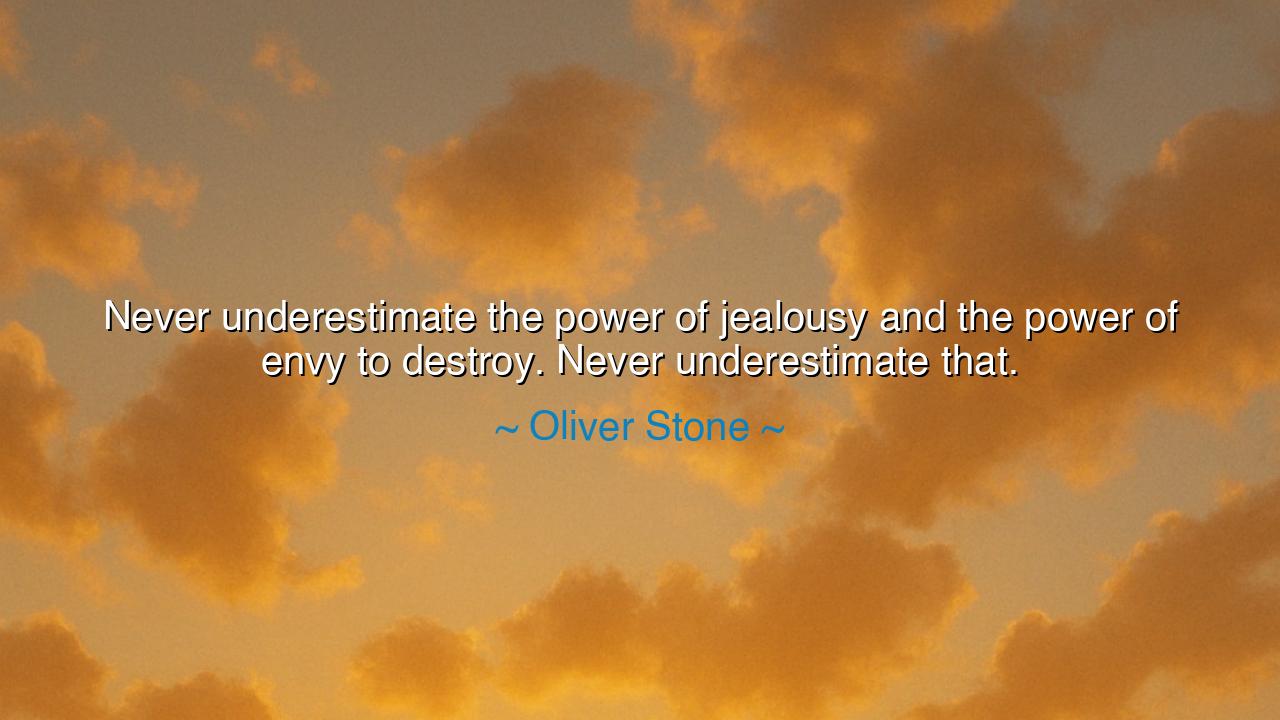
Never underestimate the power of jealousy and the power of envy
Never underestimate the power of jealousy and the power of envy to destroy. Never underestimate that.






Hearken, children of insight, and heed the words of Oliver Stone, a voice attuned to the shadows of the human soul: “Never underestimate the power of jealousy and the power of envy to destroy. Never underestimate that.” Pause upon these words, for they speak with the gravity of timeless truth. In every age, the forces of jealousy and envy have brought ruin upon kings, nations, and families. They are invisible currents, yet their strength can overturn empires and sunder hearts, leaving desolation in their wake.
Jealousy is a subtle poison. Unlike anger or fear, it creeps quietly, clouding judgment, eroding reason, and twisting affection into suspicion. Envy gnaws at the spirit, turning admiration into resentment and opportunity into grievance. Stone’s warning is profound: to dismiss these emotions as trivial is to invite catastrophe. History teaches that those who ignore the corrosive power of envy do so at peril, for it strikes not only at its object but also at the one who harbors it.
Consider the tragedy of King Saul of Israel, whose jealousy of the young David consumed him. Saul’s envy transformed loyalty into fear, admiration into treachery, and the peace of his kingdom into turmoil. The destructive power of jealousy was evident: it did not merely affect David, but ultimately poisoned Saul himself, leading to isolation, despair, and ruin. Stone’s words echo the ancient warning that envy, when unheeded, is a force capable of total devastation.
Even in the annals of empires, envy has wielded its destructive hand. The rivalry between the sons of Roman emperors often led to fratricide and civil war, as brothers, consumed by jealousy, sought power and recognition at any cost. The envy that festered in private hearts erupted into public disaster, altering the course of history. Stone’s insight reminds us that these emotions, though personal, possess the power to shape the fates of many.
Yet, the lesson is not merely to fear envy, but to understand it. Awareness is the first shield against its destructive force. By recognizing jealousy and its manifestations—restlessness, comparison, resentment—one can prevent it from taking root and spreading. The ancients taught that self-knowledge, discipline, and reflection are the antidotes to the inner poisons that threaten both peace and virtue.
Practical wisdom emerges from this reflection. Guard your heart against envy, both your own and that of others. Cultivate gratitude for your blessings, celebrate the successes of others without comparison, and focus on personal growth rather than rivalry. When you encounter jealousy, confront it with awareness and temperance, for only through vigilance can its destructive power be restrained.
Moreover, the cultivation of empathy and understanding can transform envy from a destructive force into insight. Recognize that those who harbor jealousy are themselves in turmoil, and approach such situations with patience and prudence. By doing so, one mitigates harm, preserves harmony, and converts potential destruction into lessons of resilience and wisdom.
Therefore, generations to come, remember Oliver Stone’s admonition: never underestimate the power of jealousy and envy to destroy. These are not mere trifles of the heart but forces capable of unraveling lives, relationships, and nations. Guard your spirit, cultivate self-awareness, and act with virtue and prudence, so that the shadows of envy do not dictate your fate, and so that the light of reason, integrity, and compassion may endure.
If you wish, I can also craft a more poetic and mythic version of this reflection, portraying jealousy and envy as destructive specters that stalk the soul, suitable for dramatic or meditative narration. Do you want me to do that?






AAdministratorAdministrator
Welcome, honored guests. Please leave a comment, we will respond soon